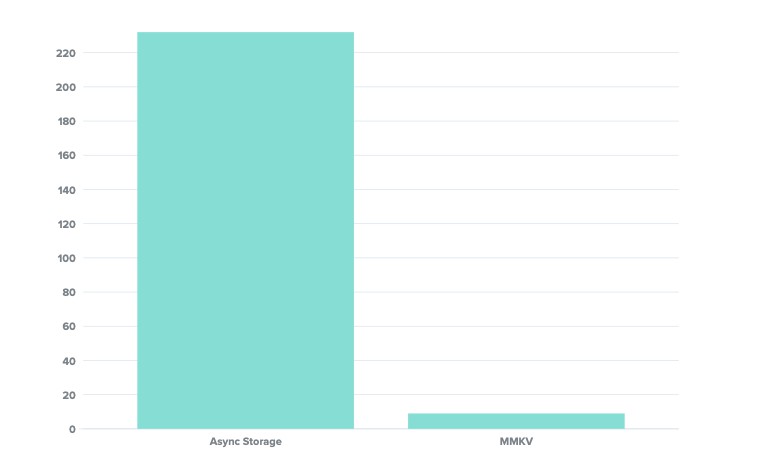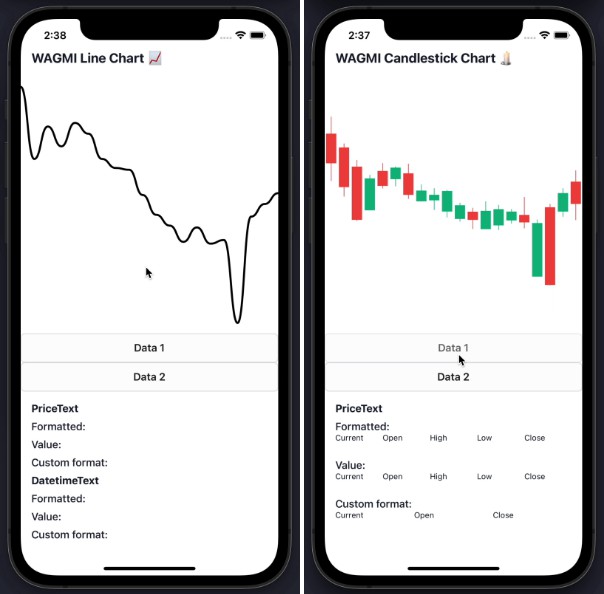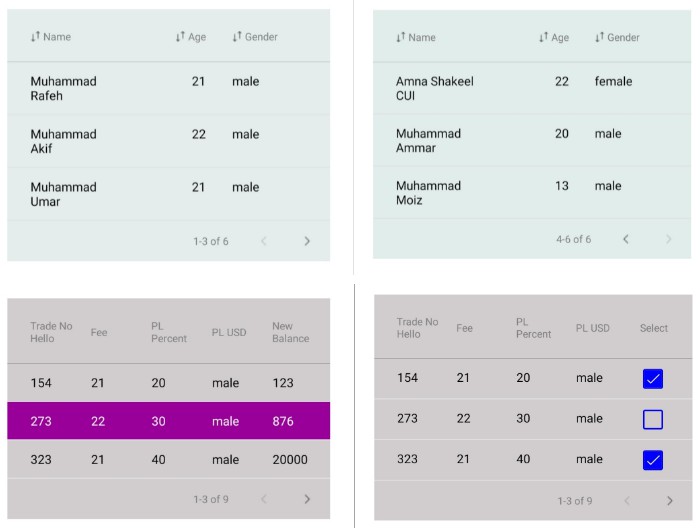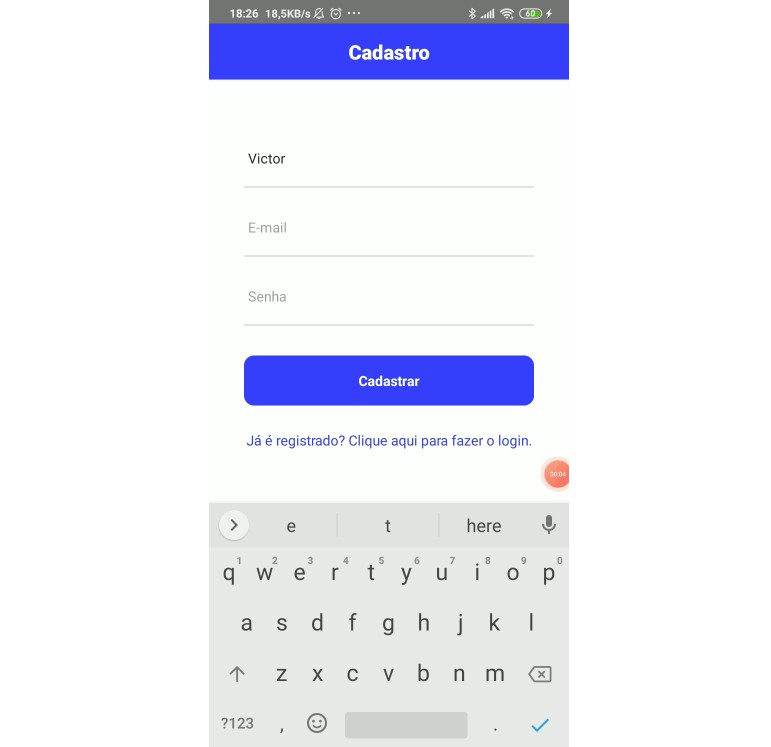MMKV
The fastest key/value storage for React Native.
- MMKV is an efficient, small mobile key-value storage framework developed by WeChat. See Tencent/MMKV for more information
- react-native-mmkv is a library that allows you to easily use MMKV inside your React Native applications. It provides fast and direct bindings to the native C++ library which are accessible through a simple JS API.
Features
- Get and set strings, booleans and numbers
- Fully synchronous calls, no async/await, no Promises, no Bridge.
- Encryption support (secure storage)
- Multiple instances support (separate user-data with global data)
- Customize storage location
- High performance because everything is written in C++ (even the JS functions have C++ bodies!)
- ~30x faster than AsyncStorage
- Uses JSI instead of the "old" Bridge
Benchmark
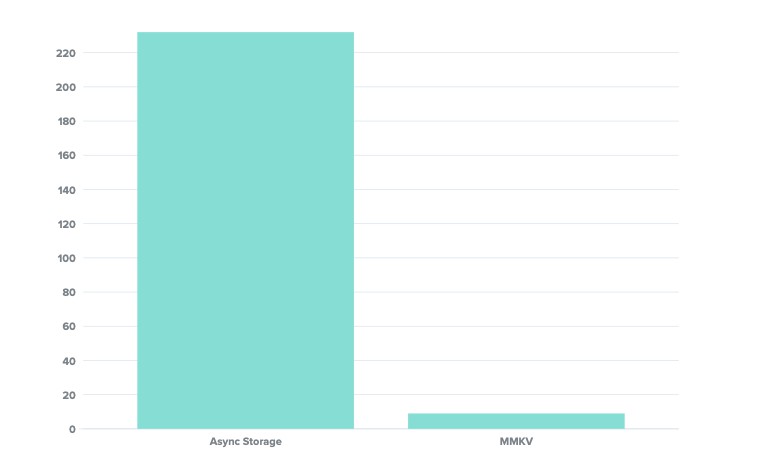
AsyncStorage vs MMKV: Reading a value from Storage 1000 times.
Measured in milliseconds on an iPhone 8, lower is better.
Installation
npm install react-native-mmkv
iOS
iOS installation is automatic, just run:
cd ios && pod install
Android
To correctly initialize MMKV on Android, please follow the Installation guide.
Usage
Create a new instance
To create a new instance of the MMKV storage, use the MMKV constructor. It is recommended that you re-use this instance throughout your entire app instead of creating a new instance each time, so export the storage object.
Default
import { MMKV } from 'react-native-mmkv'
const storage = new MMKV()
This creates a new storage instance using the default MMKV storage ID (mmkv.default).
Customize
import { MMKV } from 'react-native-mmkv'
const storage = new MMKV({
id: `user-${userId}-storage`,
path: `${USER_DIRECTORY}/storage`,
encryptionKey: 'some-encryption-key'
})
This creates a new storage instance using a custom MMKV storage ID. By using a custom storage ID, your storage is separated from the default MMKV storage of your app.
The following values can be configured:
id: The MMKV instance's ID. If you want to use multiple instances, use different IDs. For example, you can separte the global app's storage and a logged-in user's storage. (default:'mmkv.default')path: The MMKV instance's root path. By default, MMKV stores file inside$(Documents)/mmkv/. You can customize MMKV's root directory on MMKV initialization (documentation: iOS / Android)encryptionKey: The MMKV instance's encryption/decryption key. By default, MMKV stores all key-values in plain text on file, relying on iOS's/Android's sandbox to make sure the file is encrypted. Should you worry about information leaking, you can choose to encrypt MMKV. (documentation: iOS / Android)
Set
storage.set('user.name', 'Marc')
storage.set('user.age', 21)
storage.set('is-mmkv-fast-asf', true)
Get
const username = storage.getString('user.name') // 'Marc'
const age = storage.getNumber('user.age') // 21
const isMmkvFastAsf = storage.getBoolean('is-mmkv-fast-asf') // true
Keys
// getting all keys
const keys = storage.getAllKeys() // ['user.name', 'user.age', 'is-mmkv-fast-asf']
// delete a specific key + value
storage.delete('user.name')
// delete all keys
storage.deleteAllKeys()
Objects
const user = {
username: 'Marc',
age: 21
}
storage.set('user', JSON.stringify(user))
const jsonUser = storage.getString('user') // { 'username': 'Marc', 'age': 21 }
const userObject = JSON.parse(jsonUser)
Migrate from AsyncStorage
See #52 for instructions on how to safely migrate your existing AsyncStorage database to MMKV.
Limitations
As the library uses JSI for synchronous native methods access, remote debugging (e.g. with Chrome) is no longer possible. Instead, you should use Flipper.
redux-persist
If you want to use MMKV with redux-persist, create the following storage object:
import { Storage } from 'redux-persist'
const storage = new MMKV()
export const reduxStorage: Storage = {
setItem: (key, value) => {
storage.set(key, value)
return Promise.resolve(true)
},
getItem: (key) => {
const value = storage.getString(key)
return Promise.resolve(value)
},
removeItem: (key) => {
storage.delete(key)
return Promise.resolve()
},
}
mobx-persist-store
If you want to use MMKV with mobx-persist-store, create the following storage object:
import { configurePersistable } from 'mobx-persist-store'
const storage = new MMKV()
configurePersistable({
storage: {
setItem: (key, data) => storage.set(key, data),
getItem: (key) => storage.getString(key),
removeItem: (key) => storage.delete(key),
},
})
For more information, check out kanzitelli/rnn-starter.
Adopting at scale
react-native-mmkv is provided as is, I work on it in my free time.
If you're integrating react-native-mmkv in a production app, consider funding this project and contact me to receive premium enterprise support, help with issues, prioritize bugfixes, request features, help at integrating react-native-mmkv, and more.
